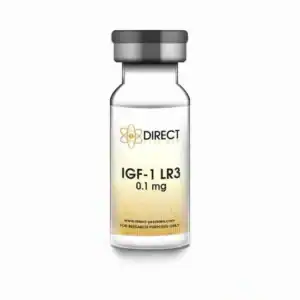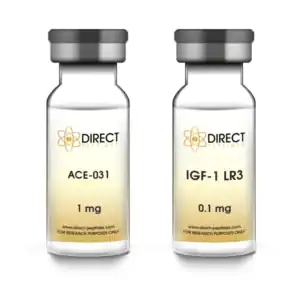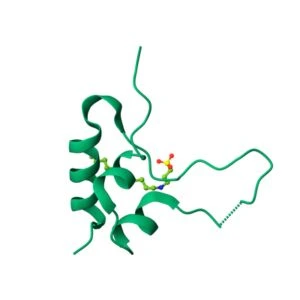Buy IGF-1 LR3 Peptide New Zealand
Buy IGF-1 LR3, also known as Insulin-like Growth Factor 1 Long R3, is a synthetic peptide designed to mimic the natural IGF-1. It offers several benefits, including boosting muscle repair and hypertrophy, speeding up recovery, improving fat metabolism, and supporting overall cell regeneration.
Shop our Full Range of IGF-1 LR3 Peptides
-

BULK BUY
BULK BUY
TWIN PACKS
IGF-1 LR3 Peptide Vial
£19.89 – £142.94Price range: £19.89 through £142.94 This product has multiple variants. The options may be chosen on the product page -
Sale!

IGF-1 LR3 Nasal Spray
£87.41 – £169.81Price range: £87.41 through £169.81 This product has multiple variants. The options may be chosen on the product page -
Sale!

IGF-1 LR3 Pre-Mixed Pen 1mg
£81.99 – £221.36Price range: £81.99 through £221.36 This product has multiple variants. The options may be chosen on the product page -
 NEW
NEWAce-031 IGF-1 LR3 Peptide Stack
£104.67 – £113.65Price range: £104.67 through £113.65 This product has multiple variants. The options may be chosen on the product page
What Is IGF-1 LR3?
IGF-1, or Insulin-like Growth Factor-1, is a natural protein made up of 70 amino acids. IGF-1 LR3 is a lab-made version with a 13-amino-acid extension at the N-terminus and a glutamic acid at position 3 replaced by arginine, earning it the name IGF-1 Long R3.
This peptide is specially designed to stay active in the body longer than natural IGF-1. This makes it more effective in triggering cell growth and repair.
It works by binding to IGF-1 receptors and the insulin receptor, which are found in many types of cells, and promoting processes like lean muscle growth, fat breakdown, and tissue healing. Its unique structure prevents it from bonding to proteins that would normally limit its effects, allowing it to produce stronger and longer-lasting results. Researchers often study this compound for its potential to improve physical recovery and enhance the body’s natural growth processes.
IGF-1 LR3 Mechanism Of Action
IGF-1 LR3 works by activating the IGF-1 receptor, a protein on cell surfaces that plays a key role in growth and metabolism. This process is closely linked to the pituitary gland, which regulates the production of growth hormone that stimulates IGF-1 activity.
When the peptide binds to these receptors, it initiates a chain reaction of signals inside the cell, primarily through the PI3K-AKT and MAPK pathways. The PI3K-AKT pathway enhances muscle building and repair by increasing protein production and reducing protein breakdown. Meanwhile, the MAPK pathway aids tissue recovery by promoting cell growth and development.
Insulin-like growth factor-1 long arginine 3 stands out because it avoids binding proteins that typically limit the effects of natural IGF-1. This allows it to remain active in the bloodstream longer, amplifying its ability to stimulate critical signaling pathways. These unique properties make it a valuable tool for research into its anabolic effects, potential therapeutic applications, and its role in metabolic health, with a connection to the pituitary gland’s regulatory functions.

Structure of IGF-1 LR3 (Long Arginine 3)
Sequence: MFPAMP LSSLFV NGPRTL CGAELV DALQFV CGDRGF YFNKPT GYGSSS RRAPQT GIVDEC CFRSCD LRRLEM YCAPLK PAKSA
Molecular Formula: C400H625N111O115S9
Molecular Weight: 9117.5 g/mol
What Are The Research Benefits of IGF-1 LR3
Enhanced Muscle Growth and Repair: It promotes muscle hypertrophy by stimulating protein synthesis and preventing protein breakdown through activation of the PI3K-AKT pathway. This makes it a valuable agent in supporting recovery and growth following physical activity or injury [1].
Improved Tissue Regeneration: Tendon injuries heal slowly and often result in weak scar tissue that can re-rupture. Insulin-like growth factor-1 has shown potential to improve tendon healing by promoting cell growth, DNA synthesis, and collagen production, especially in tenocytes.
It supports tissue and muscle regeneration and speeds up recovery. It does this by activating the MAPK pathway, which helps muscle cells grow and differentiate. While in vitro studies show its anabolic effects, its impact on stem cells is limited and works better when combined with other growth factors. More in vivo research is needed to confirm its effectiveness for tendon repair [2].
Regulation of Cell Signalling: The peptide influences various cellular processes through its interaction with cell surface receptors, particularly the IGF-1 receptor. This interaction triggers intracellular signalling cascades such as the PI3K-AKT and MAPK pathways, which are critical for regulating cell growth, survival, and metabolism. These pathways play a pivotal role in maintaining cellular homeostasis and responding to environmental stimuli, making IGF-1 LR3 a key factor in cellular communication and function [3].
Improves Metabolic Health: It helps improve glucose uptake and increase insulin sensitivity. By activating key pathways, it supports the body in using glucose, fats, and proteins more efficiently, promoting better metabolic balance. This is especially important in diabetes, where issues with insulin production or function affect glucose metabolism. Research shows it may help manage diabetes by improving blood sugar levels and reducing insulin resistance. However, more studies are needed to fully understand its potential benefits and risks [4].
Anti-aging: Beyond its roles in immune regulation and disease progression, the IGF/IGF-IR pathway has been linked to anti-aging processes. A study of 617 participants found that a higher IGF-1 to IGFBP3 ratio is associated with a younger perceived age and fewer wrinkles, suggesting that higher IGF-1 bioavailability may reduce skin aging. However, further research is needed to confirm these findings and to better understand the potential for IGF-related therapies in age-related skin treatments [5].
Immune System Support: It may strengthen the immune system by boosting the production and function of immune cells. By supporting cellular repair and regeneration, it helps regulate the immune response, improving the body’s ability to fight infections, reduce inflammation, and address immune-related challenges.
Research on the IGF/IGF-IR pathway highlights its role in tissue development, immune regulation, and autoimmune diseases. IGF-I may protect against some autoimmune conditions while worsening others, like Graves’ disease. As a key player in immune responses and disease progression, it is a promising therapeutic target. For example, monoclonal antibodies targeting this pathway are being studied in cancer treatments, with potential for future autoimmune therapies [6].
Cognition and Memory: It has been associated with improved cognitive function and memory by promoting neurogenesis and synaptic plasticity. While it plays a key role in brain development, aging, and neurodegenerative conditions, its effects are complex, with both increased and decreased IGF-1 signaling influencing disease progression [7]. Studies suggest limited cognitive benefits from LR3 alone, though it shows potential for use in combination treatments for Alzheimer’s, particularly in reducing amyloid-β plaques and enhancing microglial activity [8].
Bone, Cartilage, and Joint Health: It plays an important role in maintaining skeletal health [9]. It stimulates osteoblast growth, enhances the production of cartilage matrix proteins, and activates pathways that support bone formation. It also helps repair damaged cartilage by improving cell differentiation and matrix production. Additionally, it promotes joint health by boosting cartilage production and aiding in connective tissue repair. These combined effects may reduce joint pain, improve mobility, and address joint issues caused by aging or physical activity. However, more clinical studies are needed to confirm its potential in musculoskeletal regeneration [10].
Heart Health: It helps support heart and vascular health by improving blood vessel function, reducing inflammation, and aiding in heart tissue repair and recovery after injuries [11]. It may also boost nitric oxide production, which improves blood flow and lowers the risk of high blood pressure.
Buy IGF-1 LR3 New Zealand for scientific research online today!
Buy IGF-1 LR3 Nasal Spray
Buy IGF-1 LR3 nasal spray, it offers a simple and effective alternative to traditional administration methods. Designed for convenience, it allows the active compound to be absorbed quickly through the nasal mucosa, bypassing the need for injections. This method is both less invasive and more discreet.
The nasal spray is available in two sizes, 15 ml and 30 ml, providing flexibility depending on research needs. This innovative delivery system ensures ease of use while maintaining potent benefits.
Buy IGF-1 LR3 Pre-Mixed Peptide Pen
Buy IGF-1 LR3 pre-mixed pen 1mg, a convenient, user-friendly way to administer the peptide. It comes with a pre-measured solution, eliminating the need for mixing or calculations, which simplifies use and reduces dosing errors. Similar to insulin pens, it features a dial for precise dosing.
Choose between a Pre-Mixed Cartridge Kit or Single Mixed Cartridges. The kit includes a pre-mixed cartridge, pen, carry case, and needle tips, while single cartridges come with needle tips only. Save 10% when you buy 3 cartridges!
Frequently Asked Questions (FAQs) about IGF-1 LR3
What makes IGF-1 LR3 different from regular IGF-1?
The key difference lies in its altered amino acid structure, specifically the addition of a 13-amino-acid extension (Long R3) to the IGF-1 molecule. This modification reduces its binding affinity to IGF-binding proteins, allowing it to remain active in the body for longer periods. Consequently, IGF-1 LR3 demonstrates enhanced potency and increased efficacy in scientific research compared to regular Insulin-like Growth Factor 1.
Is IGF-1 LR3 safe to use?
IGF-1 LR3 is intended strictly for laboratory research purposes and is not approved for human or veterinary use. Researchers looking to buy IGF-1 LR3 must ensure it is handled responsibly and adhere to appropriate safety protocols to maintain proper procedures during its use.
Is IGF-1 LR3 legal?
The legal status to buy IGF-1 LR3 varies significantly across different countries and regions. It is typically classified as a research chemical, meaning its use is restricted to scientific and laboratory environments. IGF-1 LR3 is not approved for human consumption or medical use by authoritative bodies like the FDA in the United States or similar agencies in other nations. Researchers and institutions must familiarise themselves with local laws and regulations before they buy IGF-1 LR3 to ensure compliance with legal requirements.
Does IGF-1 LR3 increase fat loss?
While it is more commonly used for muscle growth, some believe it can assist in fat loss by improving metabolic function. Its ability to increase insulin sensitivity and promote muscle tissue growth could indirectly lead to a more efficient fat-burning process.
What are the side effects of IGF-1 LR3?
Common side effects can include joint pain, swelling, numbness, fatigue, dizziness and headaches. Some studies have also reported hypoglycemia (low blood sugar) due to it’s insulin-like effects. Long-term effects are not well-documented.
It may also carry potential cancer risks due to its role in cellular growth and proliferation. While research is ongoing and no definitive conclusions have been made, caution is advised, especially for individuals with cancer predispositions or existing malignancies. Further studies are needed to understand its long-term effects.
Can IGF-1 LR3 be stacked with other peptides?
Yes, it is sometimes stacked with other peptides like Growth Hormone (GH), MK-677. These stacks are often used to accelerate muscle growth or fat loss, but it’s essential to understand how each compound interacts.
Buy IGF- LR3 Peptide Vial New Zealand from Direct Peptides. Available in 0.1 mg and 1 mg vials. The lyophilized powder needs to be reconstituted with bacteriostatic water before use. To ensure peptide integrity thaw to room temperature before reconstitution.
Summary of Research Applications
- Longevity effects.
- Protein synthesis and increased strength.
- Stored fat converted into energy.
- Increased fat loss through improved metabolism.
- Improved insulin sensitivity.
- Increased bone density.
- Improved lean muscle mass.
- Nerve tissue regeneration is enhanced.
- Upregulated antioxidant benefits and ligament strength.
- Muscle hypertrophy through increased cell proliferation.
- Inhibits myostatin.
- Improved cognitive function.
IGF-1 LR3 Peptide Quality Assured
At Direct Peptides, you can buy IGF-1 LR3 peptides with 99% purity for scientific research use. Each product is rigorously tested for quality and reliability, giving researchers confidence in accurate results. Choose our peptides for safety, precision, and consistent support for your work.
References For Further Reading
[1] Anastassios Philippou and Elisabeth R. Barton (2014) Optimizing IGF-I for skeletal muscle therapeutics – Growth Hormone & IGF Research, Volume 24, Issue 5, October 2014, Pages 157-163.
[2] Iris Miescher, Julia Rieber, Maurizio Calcagni and Johanna Buschmann (2023) In Vitro and In Vivo Effects of IGF-1 Delivery Strategies on Tendon Healing: A Review – International Journal of Molecular Sciences, 2023, Volume 24 (Issue 3), Page 2370.
[3] Robert C Baxter (2023) Signaling Pathways of the Insulin-like Growth Factor Binding Proteins – Endocrine Reviews, 2023 Mar 28, Volume 44 (Issue 5), Pages 753–778.
[4] P V Carroll, E R Christ, A M Umpleby, I Gowrie, et al (2000) IGF-I treatment in adults with type 1 diabetes: effects on glucose and protein metabolism in the fasting state and during a hyperinsulinemic-euglycemic amino acid clamp – Diabetes, 2000 May, Volume 49 (Issue 5), Pages 789-96.
[5] R Noordam, D A Gunn, C C Tomlin, A B Maier, et al (2013) Serum insulin-like growth factor 1 and facial ageing: high levels associate with reduced skin wrinkling in a cross-sectional study – British Journal of Dermatology, 2013 Mar, Volume 168 (Issue 3), Pages 533-8.
[6] Terry J Smith (2010) Insulin-Like Growth Factor-I Regulation of Immune Function: A Potential Therapeutic Target in Autoimmune Diseases? – Pharmacological Reviews, 2010 Jun, Volume 62 (Issue 2), Pages 199–236.
[7] Sarah Wrigley, Donia Arafa, and Daniela Tropea (2017) Insulin-Like Growth Factor 1: At the Crossroads of Brain Development and Aging – Frontiets in Cellular Neuroscience, 2017 Feb 1, Volume 11, Page 14.
[8] Matthew G Engel, Sushma Narayan, Min-Hui Cui, Craig A Branch, et al (2025) Intranasal long R3 insulin-like growth factor-1 treatment promotes amyloid plaque remodeling in cerebral cortex but fails to preserve cognitive function in male 5XFAD mice – Journal of Alzheimers Disease, 2025 Jan, Volume 103 (Issue 1), Pages 113-126.
[9] Shoshana Yakar, Haim Werner, and Clifford J Rosen (2018) Insulin-like growth factors: actions on the skeleton – Journal of Molecular Endocrinology, 2018 Apr 6, Volume 61 (Issue 1), Pages T115–T137.
[10] Vittorio Locatelli and Vittorio E Bianchi (2014) Effect of GH/IGF-1 on Bone Metabolism and Osteoporsosis – International Journal of Endocrinology, 2014 Jul 23, Volume 2014, Page 235060.
[11] Masao Kakoki, Purushotham V Ramanathan, John R Hagaman, et al (2021) Cyanocobalamin prevents cardiomyopathy in type 1 diabetes by modulating oxidative stress and DNMT-SOCS1/3-IGF-1 signaling – Communications Biology, 2021 Jun 23, Volume 4 (Issue 1), Page 775.
Why Choose Direct Peptides New Zealand?
Buy IGF-1 LR3 today from Direct Peptides New Zealand, your trusted source for high-quality peptides. We offer a variety of unique formulations to meet your needs, including 75 iu peptide vials, peptide nasal sprays in 15ml and 30ml bottles, and 75 iu pre-mixed peptide pens. Designed to support diverse research requirements, ensuring New Zealand researchers can access the exact formulations they need for their projects.
ALL CONTENT AND PRODUCT INFORMATION AVAILABLE ON THIS WEBSITE IS FOR EDUCATIONAL PURPOSES ONLY.
DISCLAIMER: These products are intended solely as a research chemical only. This classification allows for their use only for research development and laboratory studies. The information available on our New Zealand Direct Peptides website: https://direct-peptides.com is provided for educational purposes only. These products are not for human or animal use or consumption in any manner. Handling of these products should be limited to suitably qualified professionals. They are not to be classified as a drug, food, cosmetic, or medicinal product and must not be mislabelled or used as such.
Related Posts

What Are The Best Peptides For Energy?
Explore how peptides like MOTS-C, NAD+, and IGF-1 LR3 can boost energy, stamina, and mental clarity in this blog. Learn about their benefits, mechanisms, and potential side effects, along with the importance of diet, exercise, and medical guidance for safe use. Perfect for researchers or anyone seeking to optimize energy levels.

Are You New To Growth Hormone Peptides?
Growth hormone peptides are amino acid chains that enhance the body’s natural growth hormone production, aiding growth, tissue repair, and recovery. Key types include GHRH, GHRP, and IGF-1 peptides, with options like MK-677 available in oral form. While promising for health research and sports science, medical supervision is essential.
